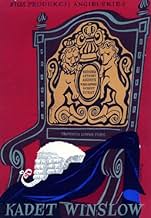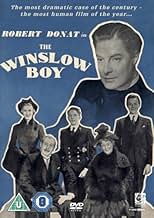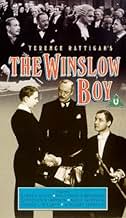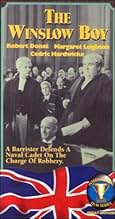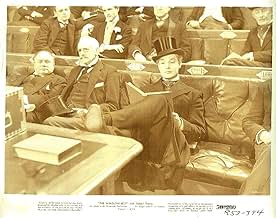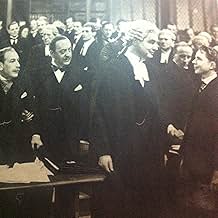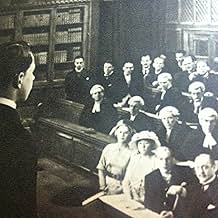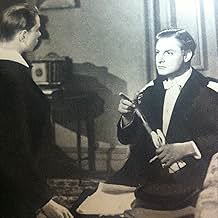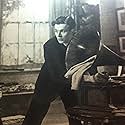VALUTAZIONE IMDb
7,6/10
1998
LA TUA VALUTAZIONE
Aggiungi una trama nella tua linguaIn pre-WWI England, a youngster is expelled from a naval academy over a petty theft, and his parents raise a political furor by demanding a trial.In pre-WWI England, a youngster is expelled from a naval academy over a petty theft, and his parents raise a political furor by demanding a trial.In pre-WWI England, a youngster is expelled from a naval academy over a petty theft, and his parents raise a political furor by demanding a trial.
- Regia
- Sceneggiatura
- Star
- Nominato ai 1 BAFTA Award
- 1 vittoria e 2 candidature totali
Cedric Hardwicke
- Arthur Winslow
- (as Sir Cedric Hardwicke)
Recensioni in evidenza
By comparison with today's more pacey films, Anthony Asquith's version of the Terence Rattigan classic might seem somewhat slow, with long shots focused on the protagonists' faces and frequent use of the shot/reverse shot technique. As a piece of character-focused drama, however, the film could not be bettered. Set just before the outbreak of World War I, the film concentrates on the trial of a thirteen-year- old boy (Neil North), wrongly accused of stealing a postal order. His father (Cedric Hardwicke) is determined to fight the case, and engages top prosecuting counsel Sir Robert Morton (Robert Donat) to plead the case. While the film works as a courtroom drama, its main focus is on characterization; those small facial gestures that appear to say so little but actually say a whole lot about the protagonists' preoccupations. The Winslow family are concerned to maintain their English sang-froid, but that becomes very difficult as the case wears on. Hardwicke is quite brilliant at showing how the case affects Mr. Winslow; his tired expression as the film unfolds is rapidly superseded by a small smile as he discovers the result and staggers outside to talk to the press. Initially Donat appears as something of a cold fish, but he admits to Winslow's daughter Kate (Margaret Leighton) by the end that this is a facade constructed purely for public consumption. The ending is quite unexpected for both of them. For lovers of British variety of the mid-twentieth century, the film contains the added bonus of two performances by Cyril Ritchard and Stanley Holloway.
This is one of the greatest movies I have ever seen, and since I turn 92 next month, I have seen a fair number of movies. Robert Donat, one of England's greatest actors ever, embodies the true-life soul of Sir Robert Morton, a high-powered attorney, who sacrificed his success for principle. Sir Cedric Hardwicke as magnificent as the accused boy's beleaguered father. Margaret Leighton's chemistry with Donat is flawless. The dialogue by Terrence Rattigan is equally classic. There are also wonderful small bits by Stanley Holloway, Cyril Ritchard, and Ernest Thesinger. If you wish to see a classic English film, almost unknown in this country, rent this one, and you are in for a treat.
Incidentally, there is also a 1998 version of this movie starring Jeremy Northam and Ian McKellen. Although it does not approach the greatness of the original, it is a more than satisfactory homage, and well worth seeing in its own right --- AFTER you've treated yourself to Donat's classic performance.
Incidentally, there is also a 1998 version of this movie starring Jeremy Northam and Ian McKellen. Although it does not approach the greatness of the original, it is a more than satisfactory homage, and well worth seeing in its own right --- AFTER you've treated yourself to Donat's classic performance.
This film adaption of Terrence Rattigan's play The Winslow Boy is highlighted by Robert Donat's performance of celebrated English barrister, Sir Robert Morton. It's one of Donat's best performances although he's more Donat that Edward Carson on whom the character is actually based.
If you want to see a more accurate portrayal of Carson and by name than the Oscar Wilde film starring Peter Finch is what you have to look at. In that one James Mason plays Carson who was by all accounts one mean man to cross, but a brilliant advocate. In that film Carson is appearing for the prosecution and he's relentless.
In his own elegant way Donat is relentless also, but he's also one cold blooded fish. As he plays Morton, the part is perfect for one of Donat's antiseptic portrayals.
The story concerns young Ronald Winslow played by Neil North who is expelled from the Naval Academy for the theft of a postal money order of five shillings. I'm sure even back in the Edwardian days this would go down as a petty theft, but it involves the military, His Majesty's military which does not make mistakes as we know.
Half the film is devoted to just letting young Mr. North have his day in court. This isn't America, he has to get permission from the government just to be allowed to defend himself. That is something that North's father Cedric Hardwicke is determined to see he gets.
It costs the Winslow family considerable. Older brother Jack Watling is not allowed to finish Oxford, sister Margaret Leighton's fiancé Frank Lawton breaks up with her because of the notoriety and Hardwicke's health goes down hill.
The Winslow Boy is based on a true incident from back in the beginning of the last century and it has good performances all around. Cyril Ritchard and Stanley Holloway do a couple of music hall numbers to capture the spirit of the time and are welcome indeed.
Still The Winslow Boy is Robert Donat's show and a good show it is.
If you want to see a more accurate portrayal of Carson and by name than the Oscar Wilde film starring Peter Finch is what you have to look at. In that one James Mason plays Carson who was by all accounts one mean man to cross, but a brilliant advocate. In that film Carson is appearing for the prosecution and he's relentless.
In his own elegant way Donat is relentless also, but he's also one cold blooded fish. As he plays Morton, the part is perfect for one of Donat's antiseptic portrayals.
The story concerns young Ronald Winslow played by Neil North who is expelled from the Naval Academy for the theft of a postal money order of five shillings. I'm sure even back in the Edwardian days this would go down as a petty theft, but it involves the military, His Majesty's military which does not make mistakes as we know.
Half the film is devoted to just letting young Mr. North have his day in court. This isn't America, he has to get permission from the government just to be allowed to defend himself. That is something that North's father Cedric Hardwicke is determined to see he gets.
It costs the Winslow family considerable. Older brother Jack Watling is not allowed to finish Oxford, sister Margaret Leighton's fiancé Frank Lawton breaks up with her because of the notoriety and Hardwicke's health goes down hill.
The Winslow Boy is based on a true incident from back in the beginning of the last century and it has good performances all around. Cyril Ritchard and Stanley Holloway do a couple of music hall numbers to capture the spirit of the time and are welcome indeed.
Still The Winslow Boy is Robert Donat's show and a good show it is.
I hadn't seen this but was aware of its starry remake some fifty years on; having now seen both, this is the better movie for several reasons. Firstly, three brilliant actors in the cast: Cedric Hardwicke, who still fools me every time and it is a surprise and joy to discover it was him after all when the credits roll; Robert Donat, who had another definitive role in this to add to Mr Chips; and the lovely Margaret Leighton, as the suffragette Winslow daughter who isn't at all militant. Secondly, the plot, which manages to weave quite a few threads along with the central story of little Ronnie Winslow and the stolen postal order. And lastly, because of the sparkle and energy of the script and the detail put into every frame. It's a wonderful film which keeps the attention from wandering, and I highly recommend it.
This film kept me in suspense not knowing what the outcome would be. The acting, period atmosphere and historical recreation are all outstanding. The Winslow Boy is directed by Anthony Asquith and has a stellar cast led by Cedric Hardwicke, Robert Donat, Margaret Leighton and others. The film evokes a period of time when honour, self-sacrifice and the heavy arm of authority ruled countries such as England in the name of the common good.
The setting is the Edwardian Era of early 20th century England and into this time and place, we find a youth who has been expelled from a naval academy for stealing. The family believes he is innocent and his recently-retired father, distant from his children, ageing and afflicted with arthritis, sees an opportunity to strike a blow for his youngest child against injustice. In jurisprudence, it is called let right be done.
In this heroic effort, Arthur Winslow the father, played by Cedric Hardwicke, is backed by the strong conviction of his daughter Kate (Margaret Leighton) and Sir Robert Morton who takes on the government of the day (Robert Donat).
Thirteen-year old Ronnie Winslow is expelled from his academy for theft. The evidence against him is real but the son is adamant that he is innocent. Arthur Winslow believes his son and takes the matter to his lawyer and eventually to the Cabinet. He is paid a visit by Robert Donat, as Sir Robert Morton, a Member of Parliament, who takes up the case.
One of the most hard-hitting scenes is a ruthless cross-examination. The boy maintains his innocence and the MP leaves their home convinced of the boy's innocence. The badgering is relentless and had me on the edge of my seat as Donat hurls one accusation after another at the boy, who does not bend during the ordeal.
Sir Robert takes a shine to Kate, Arthur Winslow's daughter, who is played by Margaret Leighton. She superbly performs the role and risks her engagement by pressing the MP to proceed with the case, which has now become a national sensation.
There is a dramatic showdown in the House of Commons and the First Lord of the Admiralty, egged on by Sir Robert, agrees to let the case go to court. The final outcome has added emotion as the senior Winslow, and Sir Robert are tired and ailing.
This is an excellent period piece as well as high drama with great acting by the leading players and those in supporting roles, particularly Kathleen Harrison, the housekeeper. The era is evoked with scenes taking place on golf courses and men's clubs where politicians discuss matters of state, not to mention the churches, concert halls and railway stations. The nation's affairs are dominated by the suffragettes and the Irish question. All-round great entertainment. Highly recommend.
The setting is the Edwardian Era of early 20th century England and into this time and place, we find a youth who has been expelled from a naval academy for stealing. The family believes he is innocent and his recently-retired father, distant from his children, ageing and afflicted with arthritis, sees an opportunity to strike a blow for his youngest child against injustice. In jurisprudence, it is called let right be done.
In this heroic effort, Arthur Winslow the father, played by Cedric Hardwicke, is backed by the strong conviction of his daughter Kate (Margaret Leighton) and Sir Robert Morton who takes on the government of the day (Robert Donat).
Thirteen-year old Ronnie Winslow is expelled from his academy for theft. The evidence against him is real but the son is adamant that he is innocent. Arthur Winslow believes his son and takes the matter to his lawyer and eventually to the Cabinet. He is paid a visit by Robert Donat, as Sir Robert Morton, a Member of Parliament, who takes up the case.
One of the most hard-hitting scenes is a ruthless cross-examination. The boy maintains his innocence and the MP leaves their home convinced of the boy's innocence. The badgering is relentless and had me on the edge of my seat as Donat hurls one accusation after another at the boy, who does not bend during the ordeal.
Sir Robert takes a shine to Kate, Arthur Winslow's daughter, who is played by Margaret Leighton. She superbly performs the role and risks her engagement by pressing the MP to proceed with the case, which has now become a national sensation.
There is a dramatic showdown in the House of Commons and the First Lord of the Admiralty, egged on by Sir Robert, agrees to let the case go to court. The final outcome has added emotion as the senior Winslow, and Sir Robert are tired and ailing.
This is an excellent period piece as well as high drama with great acting by the leading players and those in supporting roles, particularly Kathleen Harrison, the housekeeper. The era is evoked with scenes taking place on golf courses and men's clubs where politicians discuss matters of state, not to mention the churches, concert halls and railway stations. The nation's affairs are dominated by the suffragettes and the Irish question. All-round great entertainment. Highly recommend.
Lo sapevi?
- QuizThis film is based on the real-life Royal Navy cadet George Archer-Shee (1895-1914), the alleged theft took place in 1908 and the trial in 1910. Archer-Shee was commissioned in the British Army in 1913 and was killed in WWI at the First Battle of Ypres on October 31, 1914.
- BlooperWhen the film opens, a suburban train is coming into a station. The locomotive is in the livery of LNER (London & North Eastern Railway). Arthur Winslow alights having told his travelling companions that he has just retired from Lloyds Bank. When he gets home he shows his wife a pocket watch the bank gave him to mark his retirement. It's dated 1912, but the LNER wasn't created until 1923.
- Citazioni
Sir Robert Morton: I wept today because right had been done.
Catherine Winslow: Not justice?
Sir Robert Morton: No, not justice, right. It's easy to do justice, very hard to do right.
- ConnessioniVersion of The Winslow Boy (1958)
I più visti
Accedi per valutare e creare un elenco di titoli salvati per ottenere consigli personalizzati
- How long is The Winslow Boy?Powered by Alexa
Dettagli
- Data di uscita
- Paese di origine
- Lingua
- Celebre anche come
- The Winslow Boy
- Luoghi delle riprese
- London Film Studios, Shepperton, Surrey, Inghilterra, Regno Unito(studio: produced at London Film Studios Shepperton, England)
- Aziende produttrici
- Vedi altri crediti dell’azienda su IMDbPro
- Tempo di esecuzione1 ora 57 minuti
- Colore
- Proporzioni
- 1.37 : 1
Contribuisci a questa pagina
Suggerisci una modifica o aggiungi i contenuti mancanti

Divario superiore
By what name was Tutto mi accusa (1948) officially released in Canada in English?
Rispondi
